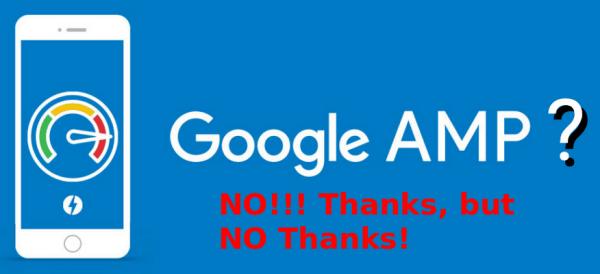Even more reasons to AVOID Google's AMP
IN January 2018 I concluded that I do not like Google’s AMP. Now I found even more reasons to dislike it, and one of them may be from Bruxelles.

AMP (Accelerated Mobile Pages) is a set of rules that online publishers must follow in order to appear in the “Top Stories” section of Google’s search results.
In anuary 2018 I explained Why I do NOT like Google’s (AMP): in a nutshell, I do not like AMP because it strenghtens Google’s control of the whole Web, in ways that amplify already existing privacy and censorship risks and makes online sharing unnecessarily difficult.
Thirteen months after that post of mine, I have found another post that confirms my doubts, and adds more to the mix. Here is my own “executive summary” of that post:
- making websites faster is supposed to be the primary benefit of AMP
- AMP is about control, not speed. Google insists you build your website with AMP, even if they doesn’t need AMP to rank pages by speed as they do.
- The practical result is that Google makes it much harder to “build an online brand with something unique or distinctive, [and serves YOUR content] from a Google domain, further diminishing your brand”.
- And this is because “Google wants people to visit Google. Not your site. Your site just feeds Google.”
When Unlike Kinds redesigned their website with AMP…
- Unlike Kinds already had a very fast website without AMP, but had to implement it anyway
- because every publisher who wants preferential treatment by Google (which in practice means “every publisher who simply cannot afford to be downranked by Google”) must implement AMP on their websites by themselves, period
- The result? an Unlike Kinds website slower, less interactive and clunkier than before AMP
- Their conclusion: “An internet where every publisher is using the same 30 components controlled by one company? No thanks.”
And all this reminds me of… the European Parliament
AMP may implement Google’s strategy to control the Web in many ways. When I read Unlike Kinds’s post, the first thing that came to my mind was the so-called “link tax” embedded in the EU Copyright Directive approved last month. Follow me here:
- The “link tax” (bad name, but popular) is supposed to make platforms like Google, who displays snippets of articles in its News search results, finally pay a fair fee to the publishers of those articles.
- The same publishers who, if they want those news to appear at all in Google, must enclose them (with their OWN money) in a format controlled by Google: a format totally outside the scope of the Copyright Directive, but made to order to make direct harvesting of user metadata bigger, direct interaction between readers and publishers harder, and ads by Adsense competitors harder to embed in articles.
In other words, AMP may very well be also one more way in which Google says, to those publishers and their allied MEPs who are now so proud for “taking back control” (sorry, couldn’t help it), “Hold my beer while I castrated your link tax even before you conceived it”. Boy, aren’t publishers and MEPs smart?
Credits for the original version of the image I used above: another, recent post explaining how the goal of AMP is to to make the web great again, but with Google controlling everything”".
Please read the full post by Unlike Kinds for all the details of their “I believed AMP, and all I got was an uglier website” story.
Who writes this, why, and how to help
I am Marco Fioretti, tech writer and aspiring polymath doing human-digital research and popularization.
I do it because YOUR civil rights and the quality of YOUR life depend every year more on how software is used AROUND you.
To this end, I have already shared more than a million words on this blog, without any paywall or user tracking, and am sharing the next million through a newsletter, also without any paywall.
The more direct support I get, the more I can continue to inform for free parents, teachers, decision makers, and everybody else who should know more stuff like this. You can support me with paid subscriptions to my newsletter, donations via PayPal (mfioretti@nexaima.net) or LiberaPay, or in any of the other ways listed here.THANKS for your support!